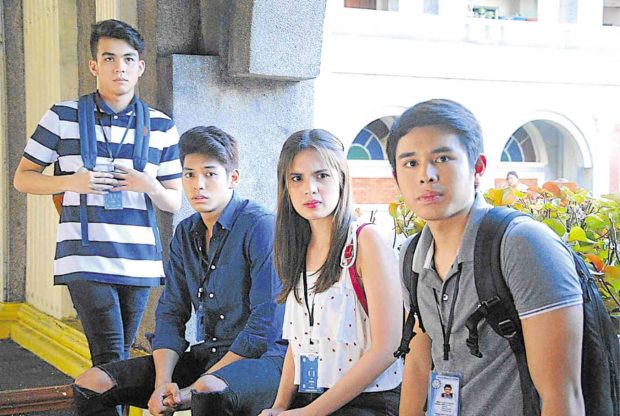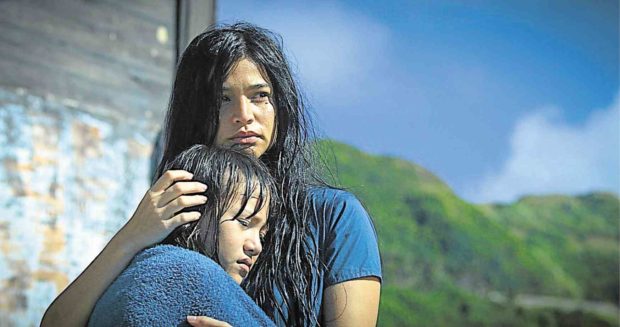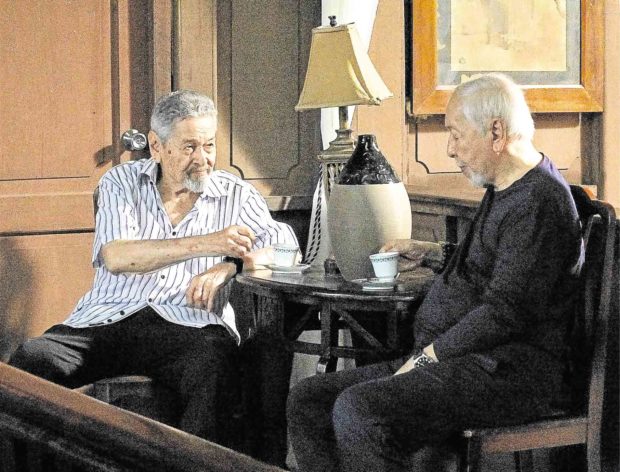MMFF 2018: Hits, misses and missteps
We spent Christmas Day watching six films that we knew would be shamelessly formulaic, knowing how the Metro Manila Film Festival (MMFF) had unapologetically eased out the “underperforming” indies after the annual fiesta’s 2016 edition.
What we didn’t expect was to sit through viewer-pandering commercial flicks that seemed like they were made in the ’80s or ’90s, just before local audiences got tired of patronizing those by-the-numbers actioners and silly comedies.
If this year’s entries really did go through a rigorous screening process, what does that say about the standards of the people behind the MMFF?
We aren’t just talking about Cannes-winning auteur Brillante Ma Mendoza’s thematically relevant “Tokhang” drama “Alpha, The Right to Kill” getting inexplicably bumped off at the last minute by the trite and contrived “Otlum,” a horror flick from the director of such films as “Vhagetz,” “Booking,” “Echoserang Frog” and “Kiskisan.”
We’re also talking about the kind of “quality” films being advocated by the Cinema Evaluation Board (CEB), which is supposed to “uphold films that are artistically and technically outstanding, and nurture films that leave a deep emotional and intellectual impact on the audience.”
Article continues after this advertisementEven if we forget batch 2016 and treat it as an anomaly, it hasn’t been impossible for the 44-year-old festival to field good films, as demonstrated by the memorable likes of “Honor Thy Father” (2015), “English Only, Please” (2014), “10,000 Hours” (2013), “Thy Womb” (2012) and “Rosario” (2010).
Article continues after this advertisementIn its glory days, the MMFF produced such indelible screen classics as “Ganito Kami Noon, Paano Kayo Ngayon,” “Minsa’y Isang Gamu-gamo,” “Insiang,” “Burlesk Queen,” “Kung Mangarap Ka’t Magising,” “Atsay,” “Rubia Servios,” “Ina Ka ng Anak Mo,” “Bona,” “Brutal,” “Kisapmata,” “Himala,” “Moral,” “Karnal,” “Bulaklak sa City Jail,” “Misteryo sa Tuwa,” “Itanong Mo Sa Buwan,” “Jose Rizal,” “Muro-Ami,” “Death Row,” “Tanging Yaman,” “Dekada ’70,” “Crying Ladies,” “Aishite Imasu 1941: Mahal Kita,” “Panaghoy sa Suba,” “Blue Moon” and “Kasal, Kasali, Kasalo.” The popularity (or monopoly) of the MMFF helped raise the commercial viability and appeal of these films.
Also, with this year’s steep decline in quality, the decision to jack up the price of admission from P280 to P310-320 is a veritable mindboggler—and, whether you agree or not, that observation isn’t just bourgeois musing. After all, a bad film is a bad film, regardless of moviegoers’ educational status or social class.
Giving Michael Tuviera’s feisty but musty “Jack Em Popoy: Puliscredibles,” one of two films that were given a grade of A by the CEB (the other being Joel Lamangan’s best picture winner “Rainbow’s Sunset”), alongside the exceptional likes of Loy Arcenas’ groundbreaking “Ang Larawan” while leaving Dwein Baltazar’s provocative “Gusto Kita with All My Hypothalamus” in the lurch early this year seems like a “this side up” gaffe that film buffs will have to figure out for years to come.
Note also that Dan Villegas’ delectable drama “All of You” was deemed worthy of a B as Joyce Bernal’s “Gandarrapiddo, The Revenger Squad” and Ian Loreños’ “Haunted Forest” were. It’s as if the CEB creates a different set of criteria every time it “reviews” a film. How does that “encourage pro ducers and filmmakers” to create more substantial films? Go figure.
‘Mary, Marry Me’
As if channeling Catriona Gray’s “universal” confidence and optimism, we eventually found the “silver lining” in the eighth—and final—MMFF film we watched on Dec. 26: RC delos Reyes’ debut film “Mary, Marry Me,” which is as winsomely well-made as it is unabashedly predictable. Who knew?
Toni Gonzaga’s chemistry with Sam Milby is as potent as ever in “Mary, Marry Me,” which also benefits from the actress’ endearing “ate-bunso” relationship with her real-life sibling. Kooky Alex plays Mary Anne, the younger sister Mary Jane (Toni) grudgingly “gives away” after their parents die in a tragic accident.
After 20 years, Mary Jane finds herself making the ultimate sisterly sacrifice when Mary Anne comes home asking for her help as she prepares to marry Pete (Sam)—who just happens to be Mary Jane’s ex-boyfriend! Could Mary Jane’s One Great Love be her younger sister’s One Bright Future?
The film fields winkingly “game” cast members (Melai Cantiveros, Moi Bien) who deliver their comic zingers with tongue firmly in cheek, but the situational comedy-honed Toni and the self-deprecating Alex’s contrasting but complimentary crowd-pleasing skills are the fuel that drives “Mary, Marry Me’s” heartwarming “love fest” engine.
‘Otlum’
Meanwhile, the cautionary chiller “Otlum” largely banks on its derivative “Carrie”-channeling elements as it warns against the deadly repercussions of bullying.
A group of friends (Jerome Ponce, Ricci Rivero, Danzel Fernandez, Vitto Marquez and Michelle Vito) learns this the hard way when they convince an eager-beaver misfit (Buboy Villar) to spend the night at an abandoned orphanage known to be inhabited by the malevolent spirit of a priest (Pen Medina) and the unhappy dead children he abused.
While it boasts scare tactics that surprise more than they scare, there’s nothing about the film that goes beyond the surface or evinces storytelling innovation.
‘Aurora’
Yam Laranas’ “Aurora” is all mood, but not enough substance. It is framed by visually stunning images whose novelty quickly dissipates, especially after its confusing progression raises more questions than answers.
As Leana, a village lass tasked to look for the missing passengers of an overloaded and overcrowded sunken ship, Anne Curtis doesn’t do badly. But not even the actress’ earnest performance and ethereal presence could put some sense into the discombobulating mythology of the curse that emanates from the remains of a 7-foot giant.
The heroine’s selective morality is another deal-breaker: “Ayokong makinabang sa patay,” she firmly points out to Alan Paule’s character when she catches him rummaging through the dead victims’ belongings. Ironically, she has no qualms accepting a P50,000 “reward” for every missing body she finds! How convenient.
‘One True Love’
It’s refreshing to see how Eric Quizon’s “One Great Love” manages to put the beautifully maturing Kim Chiu through her thespic paces as Zyra, a woman torn between the man she loves (JC de Vera, in a one-note performance), and the best friend who loves her to bits (Dennis Trillo).
However, Kim’s best effort is gravely compromised by an unsympathetic character who chooses to make the same mistakes over and over again.
Having said that, the film is a veritable showcase for best actor Dennis’ exceptional gifts. Dennis, who delivers the festival’s most textured portrayal, doesn’t need words to express a wide range of “relatable” emotions, even when much of the murky story his character navigates defies rhyme or reason.
That he transcends his movie’s limitations is a testament of his skills as an actor of great depth and empathy.
‘The Girl in the Orange Dress’
Jay Abello’s fun, frothy and frisky “The Girl in the Orange Dress”—about the unlikely “adventure” of a movie star (Jericho Rosales) and the orange dress-clad inebriated woman (Jessy Mendiola) he ends up spending the night with—may not be as substantial as you’d expect from most of Jericho’s starrers.
But it is nevertheless a breezily realized rom-com that makes clever use of the refreshing screen tandem of Jericho and movie-star lovely Jessy, as it pokes fun at the superficiality of screen stardom and the unpredictability of finding love when you least expect it.
‘Jack Em Popoy: The Puliscredibles’
Coco Martin’s anticipated collaboration with Vic Sotto and Maine Mendoza, “Jack Em Popoy: The Puliscredibles,” is better than any of the trio’s previous MMFF entries, but that really isn’t saying much.
It’s a film that seems to imagine drug-busting ideal cop Cardo Dalisay realizing that Everyman Enteng Kabisote is actually his long-lost father.
While it has “kwela” elements that are funny, its humor is for the most part dated, and its hokey sentimentality too fusty and staged for millennials to truly appreciate. Nuff said.
‘Fantastica’
Barry Gonzales’ “Fantastica” leaves no stone unturned to make sure “Fantastica” ends up becoming the 2018 festival’s runaway box-office champ—and it is. In fact, we had a hard time finding seats when we watched it.
While the production’s comic sketches and slaphappy sight gags are quiet episodic and logic-defying, Vice Ganda, as the underappreciated gay son of a former “perya” queen (Jaclyn Jose), wisely utilizes his innate ability to plug into the zeitgeist as he pokes fun at himself and everybody around him—including his dashing love interests, Richard Gutierrez and Dingdong Dantes.
Vice knows his raison d’être, so if you watch his films, you’d be foolish not to know what you’re getting yourself into.
‘Rainbow’s Sunset’
Joel Lamangan’s LGBT-themed best picture winner “Rainbow’s Sunset” has the “big issue” to bolster its credibility.
It follows the story of 84-year-old former senator Ramon (Eddie Garcia) after he abandons his wife, Sylvia (best actress Gloria Romero), to take care of his cancer-stricken best friend, Alfredo (Tony Mabesa)—who’s actually been his secret lover for years!
The ex-solon’s decision, a secret that Ramon and Sylvia have been keeping since their 10th wedding anniversary, inadvertently creates a scandal that wreaks havoc on the lives of his three children (Tirso Cruz III, Aiko Melendez and Sunshine Dizon).
But, while the film deserves to be commended for its gender rights-evening advocacy, it doesn’t take long before it crumbles on the weight of its melodramatic schmaltz and heavy-handed proselytizing.







